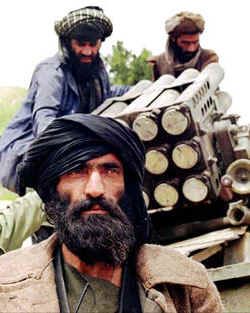
You won't get this unvarnished reality from Stephen Harper or any other Afghanistan cheerleaders but we need to understand the rot that is today's Afghanistan, the rot we're expecting our soldiers to give their lives to defend.
Here's a very different look at what's going on over there from Kathy Gannon of the Associated Press:
"But government help hasn't reached many Afghans, and much of the country has returned to the same 1990s anarchy and lawlessness that gave rise to the Taliban's iron-fisted rule.
"Taliban fighters defend villagers against criminal gangs which often are linked to the government, he said. They don't perform the arbitrary arrests and searches that are conducted by the Western troops who occasionally patrol the region. Also boosting their ranks are Western air strikes that often kill civilians along with combatants.
"If this is all they are going to do for us, is kill us, they should get out," shouted Ghulab Shah, a middle-aged man from Ashogho in southern Kandahar after nine of his neighbors were killed as they slept when a NATO bomb blasted their home.
"Kandahar governor Asadullah Khalid shares the frustration. "How are we supposed to bring security to the country with this kind of thing happening?" he asked.
"The government, he said, can replace the houses destroyed in the raids. "But who do you build a house for if they are all dead?"
"The Taliban defeat in 2001 provoked a backlash against their harsh rule and a surge in support for the new government. From Zabul province in southeast Afghanistan, 2,000 young men went to Kabul to sign up for the new national army or police forces.
"All returned, police officials say, frustrated by poor salary or perceived ethnic bias in the new government. All but four joined the Taliban, they said.
"And to the common people, criminal gangs abetted by the police and military are as big a threat in many areas as the fundamentalist militia, said Noor Mohammed Paktin, Zabul's police chief.
"'Many times when they say Taliban attacked cars on the highway, it is thieves, sometimes ... with the help of the police,' Paktin said in his office in Zabul's provincial capital, Qalat.
"Roads through the province are dangerous. Even the highway between Kabul and Kandahar, built with U.S. money and hailed as a symbol of Afghanistan's post-Taliban rebirth, is normally empty by early afternoon because of checkpoints run by the Taliban, thieves or rogue police.
"Today, local officials say, most of Zabul province is under Taliban control. In Kandahar and Helmand provinces in southern Afghanistan, government influence is restricted to the capital cities and a few district headquarters, according to Najibullah, a career police officer who asked that his full name not be used, for fear of being disciplined.
"Rather than try to defend the village of Musa Qalat in Helmand Province, Najibullah said, British soldiers and their Afghan army allies pulled out in mid-October. They handed villagers 200 rifles and, in essence, wished them luck.
"'In Musa Qala the government is there only in name,' Najibullah said.
"Police morale is low, he said, and officers have not been paid in months. About 70 of his 350 men have quit. "Why am I fighting?" Najibullah said. "Because I am a career military man and I should defend the government. But I know that from the ministers right down to the soldiers they are all thieves."
"Some Afghans who welcomed the U.S.-led troops five years ago now resent them. Even after years of operating in Afghanistan, Najibullah said, NATO and U.S. forces still get caught in the middle of tribal feuds and ancient grudges, raiding homes or attacking villages on dubious tips.
"The Taliban have also made an ally of Afghanistan's endemic poverty.
"They recruit many disaffected and unemployed young men within Afghanistan and in places like the Qari Jangel refugee camp in Pakistan's remote southern Baluchistan province, said Christopher Alexander, deputy special representative of the U.N. secretary general in Afghanistan.
"Pakistani authorities ordered the camp closed in April, but it remains open. Local officials say the order comes from the United States, and they refuse to enforce it.
Alexander called cross-border support for the Taliban "very strong."
"He said only a few of the fighters in southern Afghanistan are ideologically committed Taliban, or foreign jihadists. Most, he said, are simply Afghan villagers drawn to the movement by tribal honor, frustration or the need for a job."
And our answer to this is to muster another 2,500 troops? These are problems that are endemic to Afghanistan and they're fatal to everything we're trying to accomplish there. Odd, isn't it, that our leaders can't bring themselves to debate this?
No comments:
Post a Comment